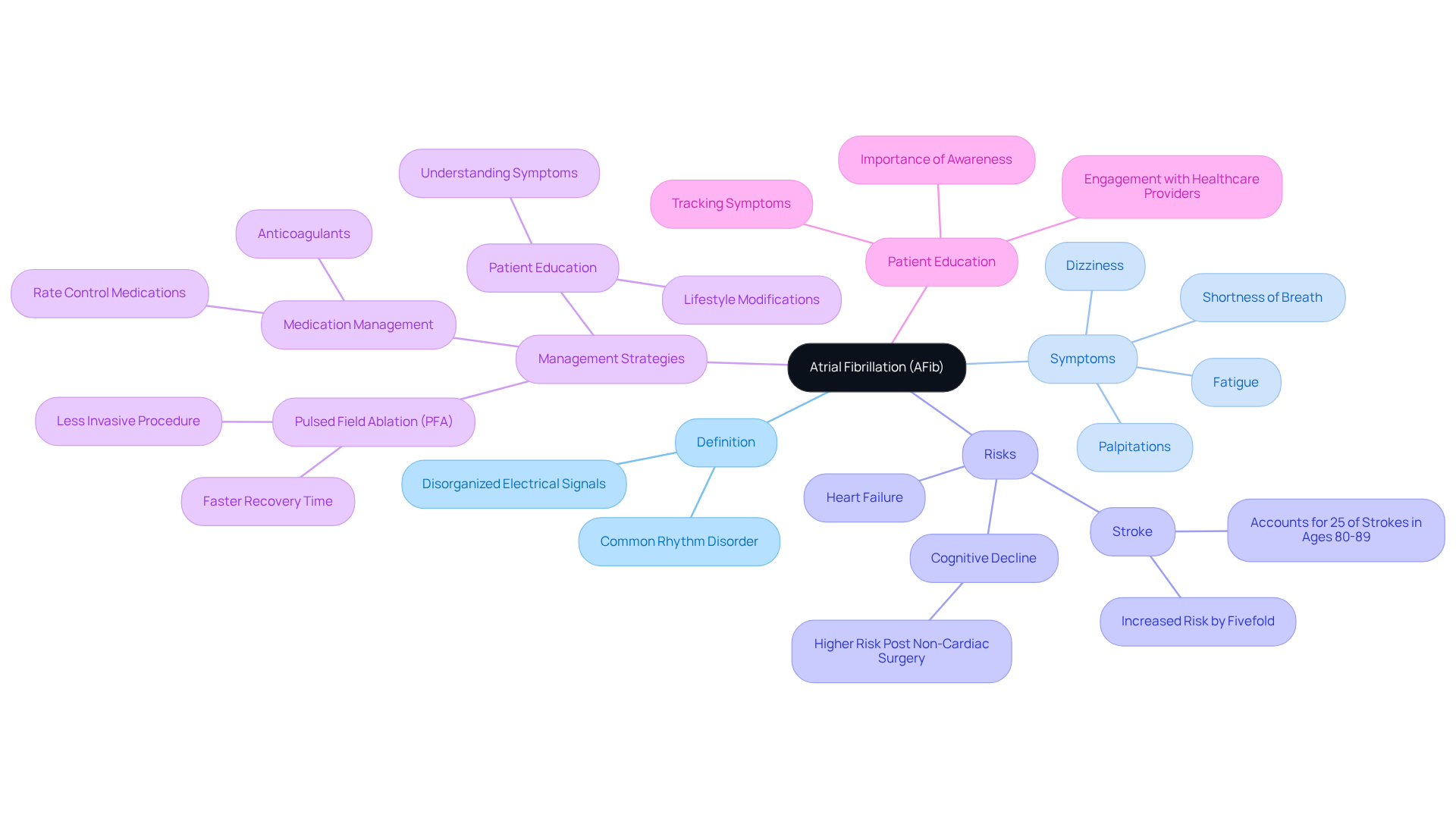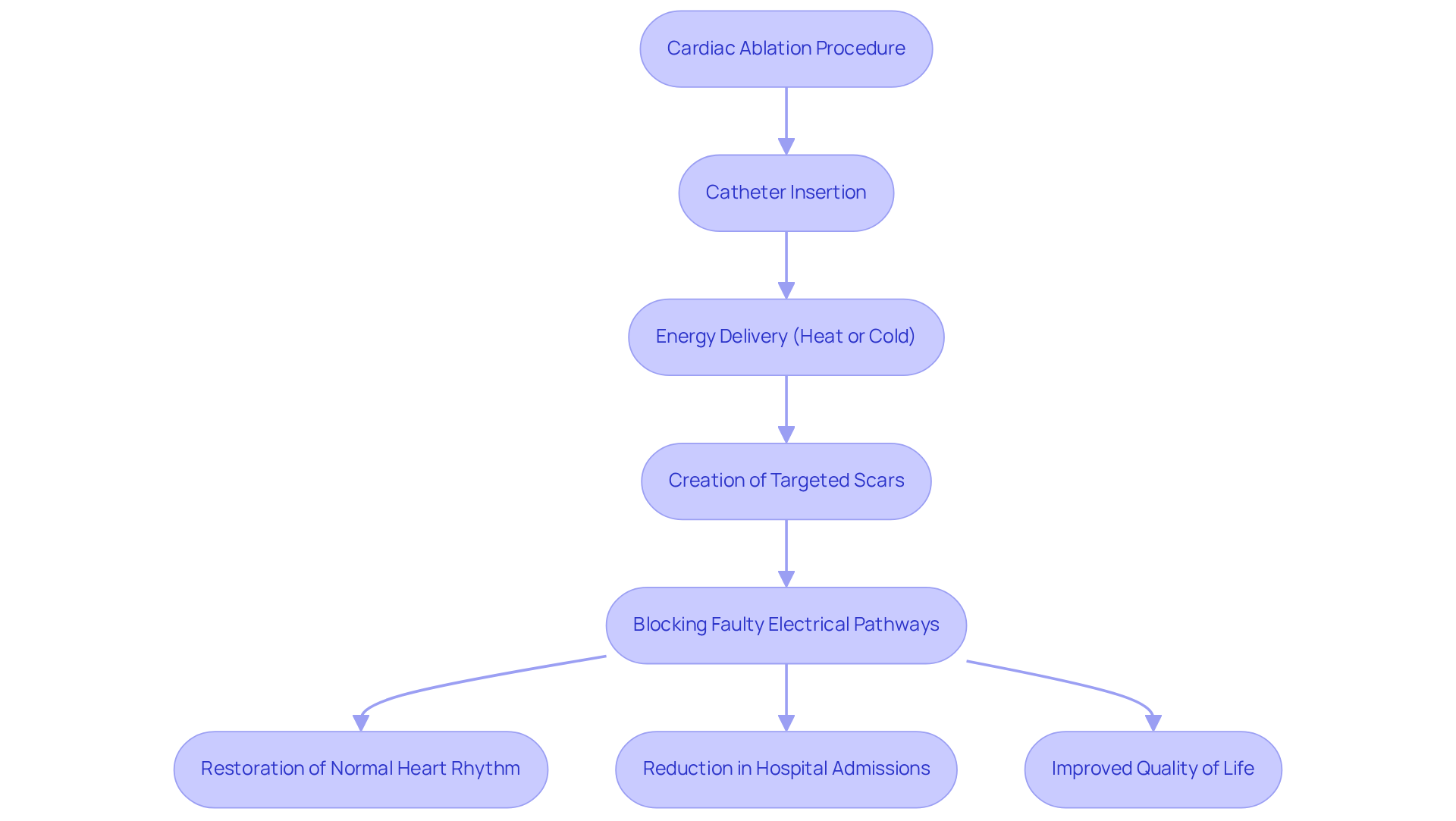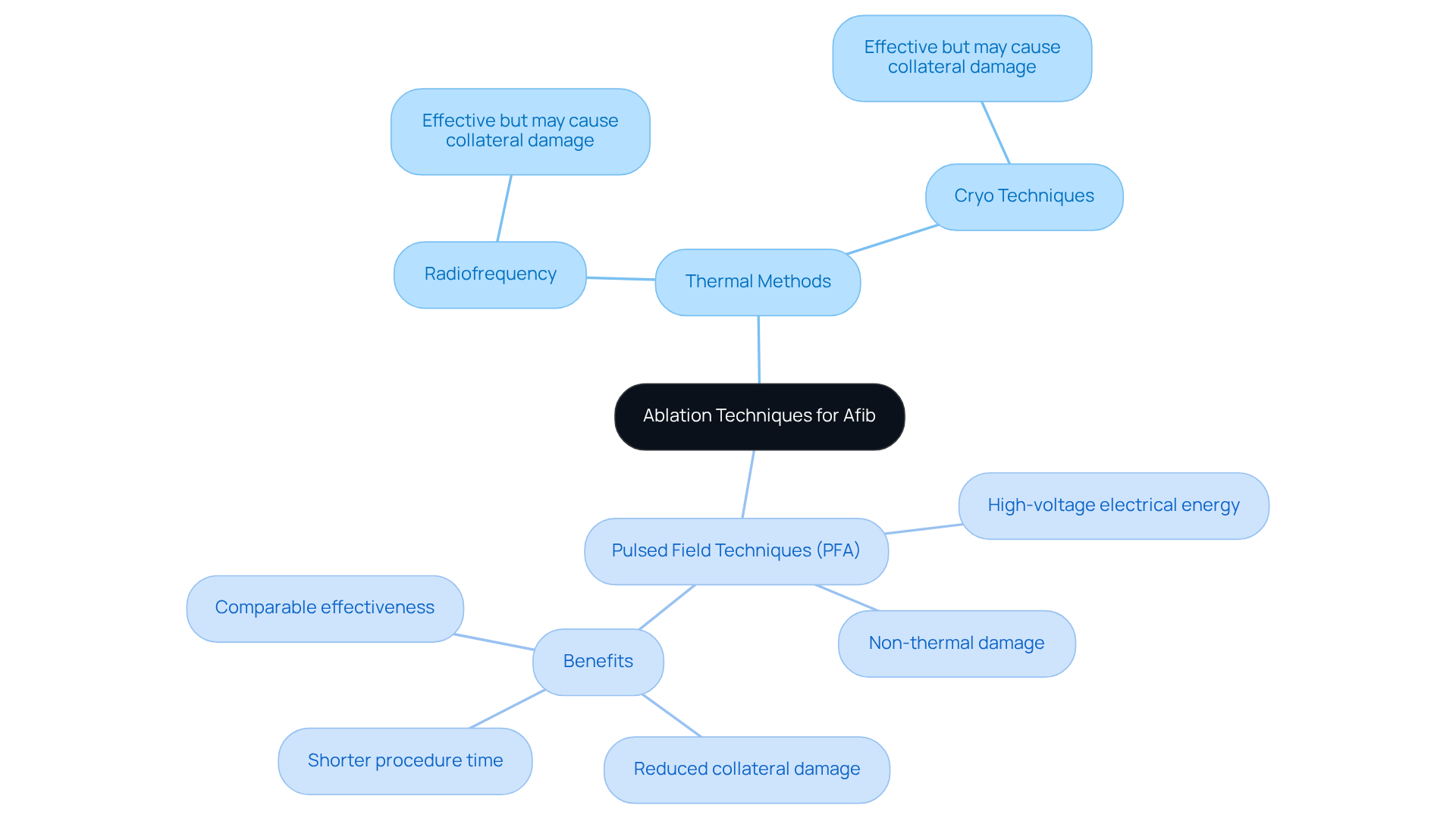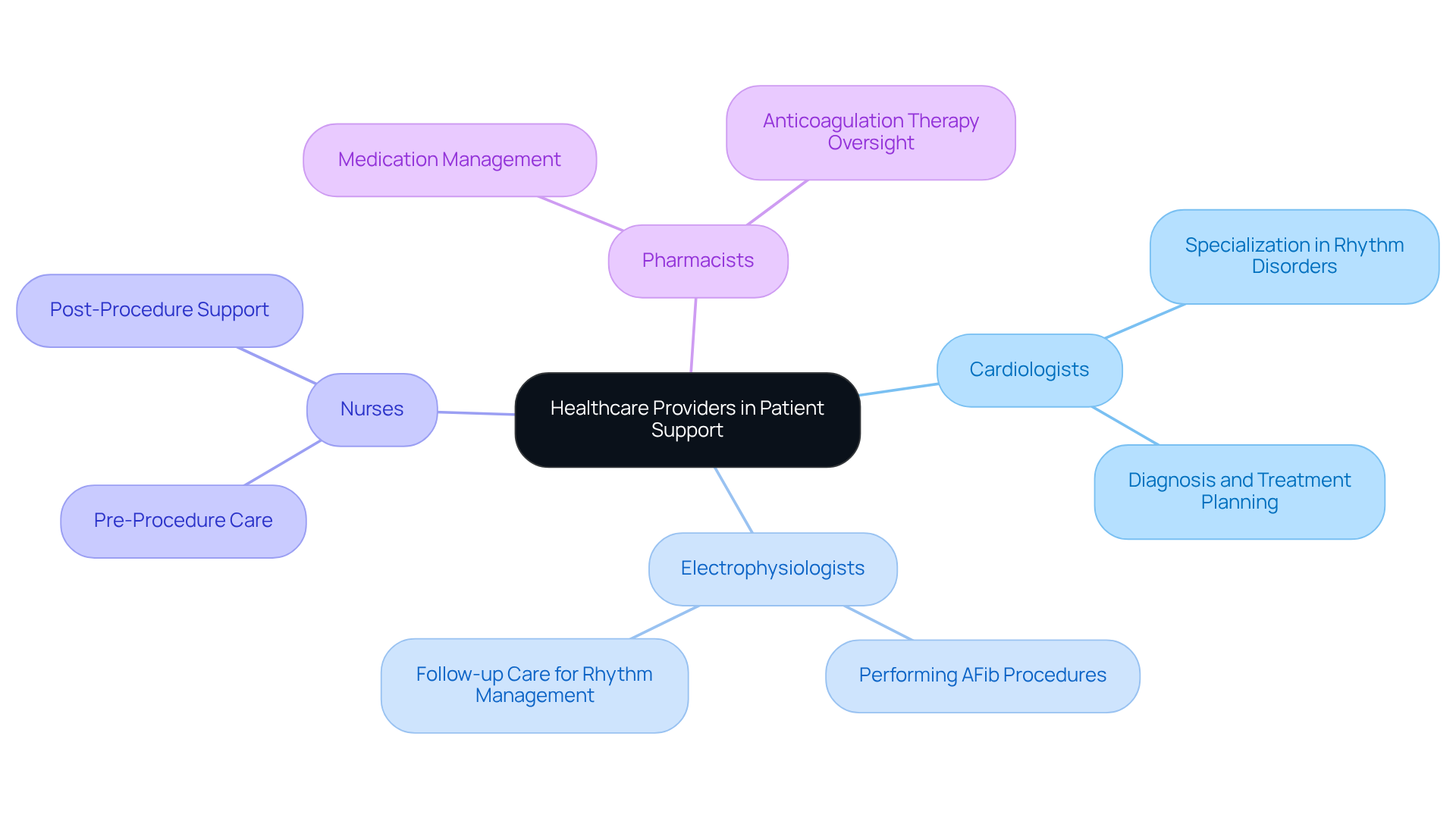


Atrial Fibrillation (AFib) is more than just an irregular heartbeat; it can lead to serious health issues like stroke and heart failure, especially as we age. Many patients may feel anxious or uncertain about their health, and that’s completely understandable. It’s important to grasp the complexities of AFib and explore the treatment options available, such as cardiac ablation, to help regain control over one’s health.
But with so many techniques and advancements in treatment, how can you navigate these complexities to ensure the best outcomes? This article aims to shed light on the AFib procedure, highlighting the benefits of cardiac ablation and the essential role healthcare providers play in supporting you on your journey to recovery. Remember, you’re not alone in this; there are compassionate professionals ready to guide you every step of the way.
Atrial Fibrillation is a common and often rapid rhythm disorder that can lead to serious health issues, such as stroke and heart failure. This condition occurs when the heart's electrical signals become disorganized, causing the atria, or upper chambers of the heart, to quiver ineffectively instead of contracting properly. You might experience a range of symptoms, from palpitations and shortness of breath to fatigue and dizziness.
As we age, the occurrence of atrial fibrillation increases significantly, affecting about 10% of people over 80 years old. This age group faces heightened risks for complications like blood clots, which can lead to ischemic strokes, accounting for over 25% of strokes in individuals aged 80 to 89. If left untreated, atrial fibrillation can raise the risk of stroke by five times, making the procedure for afib detection and management essential for your health.
Recent studies have shed light on the challenges of managing atrial fibrillation in older adults, who often have multiple health conditions that complicate treatment options. For instance, research found that individuals with atrial fibrillation who underwent non-cardiac surgery had a 20% higher risk of being diagnosed with dementia compared to those without the condition. This suggests that atrial fibrillation may contribute to cognitive decline, which is understandably concerning.
Experts emphasize the importance of patient education and ongoing management strategies in the procedure for afib to help reduce these risks. As Dr. Saxonhouse points out, addressing all contributing factors to atrial fibrillation is vital for improving health outcomes. With advancements in treatment options, such as pulsed field therapy (PFA), the procedure for afib enables individuals to achieve better management of their atrial fibrillation symptoms and experience fewer complications, ultimately enhancing their quality of life.
Understanding atrial fibrillation and its potential health effects is crucial for both patients and caregivers. This knowledge empowers you to recognize symptoms and seek prompt medical attention, ensuring you receive the support you need.

Cardiac ablation is a minimally invasive procedure for AFib designed to assist those struggling with arrhythmias. If you’re feeling overwhelmed by irregular heartbeats, know that this procedure aims to eliminate the small areas of cardiac tissue that cause these abnormal electrical signals. During the process, catheters are carefully inserted through blood vessels to reach the heart, where they deliver energy-either heat or cold-to create targeted scars in the cardiac tissue. These scars effectively block the faulty electrical pathways, helping to restore a normal heart rhythm.
At Amavita Heart and Vascular Health®, we prioritize personalized cardiovascular care for individuals at high risk. We use advanced imaging and thorough evaluations to ensure the best possible outcomes. The benefits of cardiac intervention extend beyond just alleviating symptoms; it can significantly enhance your quality of life and reduce the risk of stroke. Research indicates that individuals experience a 28-33% decrease in hospital admissions one year after the procedure for AFib, highlighting its effectiveness in managing the condition. Additionally, the overall complication rate for heart catheterization procedures is estimated at just 4.51%, with major complications occurring in only 0.9% of cases at centers that follow strict safety protocols.
Real-world outcomes further illustrate the success of this treatment. For instance, initial procedures can prevent late recurrences in 60-70% of individuals with paroxysmal AF, while long-term success rates can rise to 79.8% with multiple interventions. Moreover, advancements in technology, such as the POLARx™ FIT system-a size-adjustable cryoballoon-have shown promise in minimizing risks and improving procedural efficiency. Success rates for AI-guided procedures have reached up to 88% after 12 months.
As we continue to learn more about the procedure for AFib, cardiac intervention stands out as a vital option for those seeking effective and minimally invasive ways to manage their condition. With an estimated 12.1 million individuals in the U.S. expected to be diagnosed with atrial fibrillation by 2030, the need for effective therapies like cardiac ablation is more important than ever. Early treatment is crucial, as it can lower the risk of recurrence by 27%. We encourage individuals to consider participating in studies like the VIBRANT-AF Study, which aims to improve care for those with AFib. At Amavita, our commitment to innovative cardiovascular care ensures that you receive personalized, patient-centered approaches that prioritize your health and well-being.

When it comes to the procedure for afib, many patients may experience feelings of anxiety or uncertainty. It's important to understand that there are two main techniques used: thermal methods and pulsed field techniques (PFA).
Thermal destruction, which includes methods like radiofrequency and cryo techniques, uses heat or cold to eliminate problematic cardiac tissue. While these methods can be effective, they sometimes cause unintended damage to surrounding tissues, which can lead to complications.
In contrast, pulsed field removal is a newer, innovative technique that delivers short bursts of high-voltage electrical energy. This method creates non-thermal damage to heart cells, which means it can target the problem areas more precisely, reducing collateral damage and improving safety for patients.
Isn't it reassuring to know that recent studies show PFA not only matches the effectiveness of thermal methods but also offers a shorter procedure time and a better safety profile? For example, in the ADVENT trial, PFA successfully treated 73.3% of individuals, showing results comparable to thermal ablation, which treated 71.3%.
As advancements in PFA technology continue, it’s becoming a promising option, especially for those dealing with drug-resistant atrial fibrillation. Ultimately, the choice of the procedure for afib depends on individual factors and the specific characteristics of each patient's condition. Remember, you are not alone in this journey, and there are options available to help you feel better.

Healthcare providers play a crucial role in supporting patients with atrial fibrillation (AFib) throughout their treatment journey at Amavita Heart and Vascular Health®. This dedicated team typically includes:
Pharmacists also contribute significantly by managing medications that help control heart rate and prevent blood clots. By working together, these professionals ensure that each individual receives comprehensive care tailored to their unique needs, especially for those at higher risk due to conditions like diabetes and hypertension.
Effective communication within the healthcare team and with patients is vital for addressing concerns, managing expectations, and facilitating a smoother recovery process. Have you ever felt more satisfied when your care team collaborates? Research shows that individuals who engage with a multidisciplinary group often express greater satisfaction with their treatment. This highlights the importance of a coordinated approach in managing atrial fibrillation. For instance, shared decision-making models have been shown to enhance patients' understanding of their condition and align treatment plans with their personal health goals, leading to better adherence and outcomes.
Real-world examples of successful collaborative care models include integrated clinics where cardiologists, electrophysiologists, and primary care providers work together to oversee and manage patients with atrial fibrillation. This approach not only simplifies care but also fosters a supportive environment that empowers individuals to take an active role in their health management. As the prevalence of atrial fibrillation continues to rise, focusing on a multidisciplinary procedure for AFib becomes increasingly essential to ensure optimal outcomes for patients. With 84% of individuals with AFib experiencing hypertension and 43% facing heart failure, the complexity of care requires a proactive strategy that includes effective anticoagulation management, as highlighted in recent guidelines. This comprehensive focus on patient care is vital for improving overall health outcomes, reflecting Amavita's commitment to delivering advanced cardiovascular care through innovative research and minimally invasive techniques.

Understanding atrial fibrillation (AFib) and the procedures available for its management is essential for improving patient outcomes and quality of life. AFib is more than just a heart rhythm disorder; it poses significant health risks, especially for older adults. Cardiac ablation stands out as a vital intervention that can effectively restore normal heart rhythms and significantly reduce the risks associated with AFib, including stroke and hospitalization.
Key insights reveal the effectiveness of cardiac ablation techniques, both thermal and pulsed field, in addressing the underlying causes of AFib. These procedures do more than just relieve symptoms; they offer a substantial reduction in hospital admissions and improved long-term outcomes. Furthermore, the role of healthcare providers in delivering coordinated, patient-centered care is crucial for ensuring that individuals with AFib receive comprehensive support throughout their treatment journey.
As the prevalence of atrial fibrillation continues to rise, it’s increasingly important for patients and caregivers to stay informed about the available treatments and the role of healthcare teams. Engaging in proactive health management and participating in ongoing research can empower individuals to take control of their heart health. By understanding the complexities of AFib and the advancements in treatment options like cardiac ablation, patients can make informed decisions that lead to better health outcomes and enhanced quality of life.
So, if you or a loved one is facing AFib, remember that you’re not alone. Reach out to your healthcare team, ask questions, and explore the options available to you. Together, we can navigate this journey towards better heart health.
What is Atrial Fibrillation (AFib)?
Atrial Fibrillation is a common and often rapid rhythm disorder that leads to serious health issues, including stroke and heart failure. It occurs when the heart's electrical signals become disorganized, causing the atria to quiver instead of contracting properly.
What are the symptoms of Atrial Fibrillation?
Symptoms of Atrial Fibrillation can include palpitations, shortness of breath, fatigue, and dizziness.
How does age affect the occurrence of Atrial Fibrillation?
The occurrence of Atrial Fibrillation increases significantly with age, affecting about 10% of people over 80 years old.
What are the risks associated with untreated Atrial Fibrillation?
If left untreated, Atrial Fibrillation can raise the risk of stroke by five times and lead to complications such as blood clots, which account for over 25% of strokes in individuals aged 80 to 89.
How does Atrial Fibrillation impact cognitive health?
Research indicates that individuals with Atrial Fibrillation who undergo non-cardiac surgery have a 20% higher risk of being diagnosed with dementia compared to those without the condition, suggesting a potential link to cognitive decline.
What is the importance of patient education and management strategies for Atrial Fibrillation?
Patient education and ongoing management strategies are vital for reducing risks associated with Atrial Fibrillation, as they help individuals recognize symptoms and seek prompt medical attention.
What advancements exist in the treatment of Atrial Fibrillation?
Advancements such as pulsed field therapy (PFA) have been developed to improve the management of Atrial Fibrillation symptoms and reduce complications, ultimately enhancing the quality of life for patients.
Why is it important to understand Atrial Fibrillation and its health effects?
Understanding Atrial Fibrillation and its potential health effects empowers patients and caregivers to recognize symptoms and seek timely medical support, ensuring appropriate care and management.